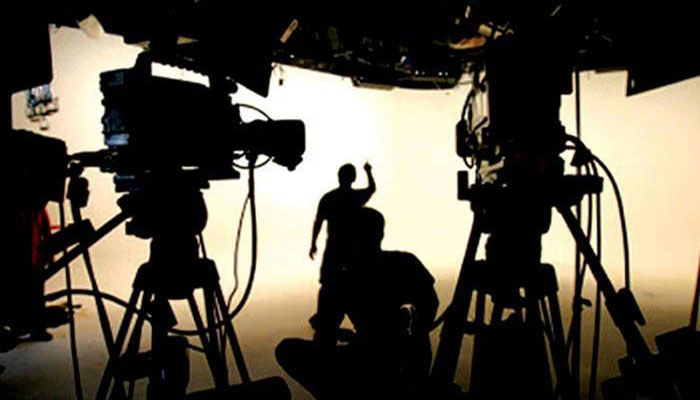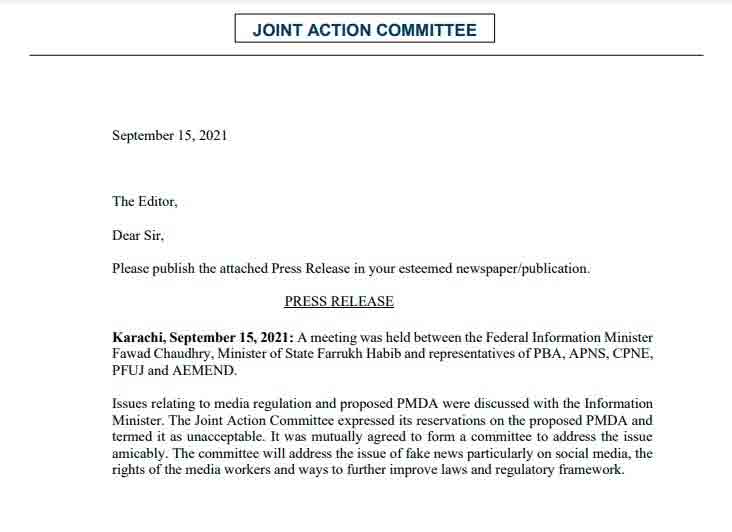Govt, media bodies agree to form committee to deal with fake news on social media
ISLAMABAD/LAHORE: The Ministry of Information and Broadcasting and representatives of media bodies Wednesday agreed to form a committee to discuss issues such as fake news on social media, rights of media workers and further improvement of laws and regulatory framework.
To this effect, representatives of PBA, APNS, CPNE and PFUJ and AEMEND called on Federal Minister for Information Chaudhry Fawad Hussain and Minister of State for Information and Broadcasting Farrukh Habib. Both sides agreed on the formation of a body, comprising representatives of PBA, APNS, CPNE, PFUJ and AEMEND and Ministry of Information.
During the meeting, discussions were held on the proposed Pakistan Media Development Authority (PMDA). Media organisations expressed reservations over the proposed PMDA and termed it as unacceptable.
Earlier, a meeting of the Senate Standing Committee on Information and Broadcasting on the proposed PMDA was held under the Chairmanship of Senator Faisal Javed here at the Parliament House. Minister for Information and Broadcasting Chaudhry Fawad Hussain and State Minister Farrukh Habib briefed the committee on the concept paper for PMDA.
The committee chairman Senator Faisal Javed of PTI highlighted that Prime Minister Imran Khan would never put curbs of any kind on the freedom of speech and press. “Prime Minister Imran Khan completely believes in freedom of expression. He will never put curbs of any kind on the freedom of speech and press,” he emphasised.
He added that the PTI's manifesto says, “We are committed to maintaining a vigorous free media, which will evolve its own rules to ensure responsible journalism”. He welcomed all the stake holders (PBA, CPNE, PFUJ, PRA, AEMEND), representatives of journalist bodies and other national media groups, who expressed their reservations and point of view on the proposed PMDA.
“We want all journalist organisations and media workers’ opinions and suggestions to be brought to the fore. Everyone must work together for the promotion of freedom of press and development of media,” he stressed. He added that the good things of PMDA should be appreciated and flexibility should be shown for improvement.
He reiterated that as long as the proposed PMDA guarantees the rights of the freedom of journalism and interest of the nation at large, we should acknowledge it. The committee chairman said that the PMDA bill has not been put before our committee so far.
Briefing the committee on the proposed PMDA, Fawad said that first time in the history of Pakistan all the stakeholders along with the legislative bodies are extensively being consulted. He said that bill will not be introduced in case of lack of consensus on government ideas regarding the PMDA.
He said that it has become a convention by the opposition to oppose every bill proposed by the government, however this is an important bill and we should work above party lines to understand the spirit and objective behind the bill.
Fawad lamented the fact that a fake ordinance was issued to misinterpret and create chaos in the country against the media freedom which the government believes is their utmost right. He said that primarily this idea is based to address four central points, including the convergence of broadcast, digital , telecom and print media, protecting the rights of the media workers, protection from abusive harmful content and fake news and a robust complaint redressal mechanism, rationalisation of imposing fine on violations and reducing regulatory cost. It was also briefed that media tribunal will consist of ten members including a chairman. The chairman of the tribunal shall be a person who has been, or is qualified to be a judge of the high court or Supreme Court.
The committee chairman believed that many technical questions have been raised on PMDA. He questioned whether or not many of the good goals/objectives that are included in the PMDA, are possible without this integration? He said that fake news is a big challenge today. The information systems have become more polarised & contentious. “We need to tackle fake news via strengthening libel laws, encouraging independent professional journalism. Technology can also be used to identify fake news via algorithms & crowd-sourcing,” he said. He gave chance to all the stakeholders to come in the front and express their views and give their input.
While lamenting of PMDA, Irfan Siddiqui said that media was not treated in such a way during martial law. Nawaz Khokhar said that there are reservations of journalists’ organisations and opposition on PMDA.
Representative of PBA said that the current government does not like media. The stakeholders, while expressing their reservations on the PMDA, unanimously believed that instead of introducing new law for the media, the existing laws should be strengthened.
The committee chairman said that the existing bodies like PCP need to be strengthened: Also there is no forum for electronic media hence PCP may be converted into the media council of Pakistan to deal with issues related to media in general.
Earlier in the meeting, briefing on the Directorate of Electronic Media & Publications (DEMP) was also received by the committee members. The committee was told the total sanctioned strength of the organisation which is 369 and total working strength which is up to 300.
The committee was also briefed on the budget of the DEMP for the year 2021-2022 which is Rs300.078 million out of which the employee related expenses are Rs207.022 million and operational expenses are Rs93.056. The committee was briefed in detail on the overall working of the DEMP and on publications and documentaries.
The committee chairman concluded the meeting to sit again after the receiving of the legislative draft on the proposed PMDA bill. The meeting was attended by Senator Aon Abbas Buppi, Mustafa Nawaz Khokar, Anwar Lal Dean, Muhammad Tahir Bizenjo, Irfan ul Haque Siddiqui, in addition, the Minister for Information and Broadcasting Fawad and all the stakeholders (PBA, CPNE, PFUJ, PRA, AEMEND) attended committee meeting.
Meanwhile, journalists reiterated their resolve to stand for their right to freedom of expression in a meeting called by PFUJ at Lahore Press Club on Wednesday. HRCP, lawyer bodies and civil society were all with journalists and had their good representation in the meeting.
PFUJ General Secretary Nasir Zaidi said, “Rule of law and basic rights are being violated. Media is going through the worst phase in history in this country. The way big newspapers have cut down pays despite announcement of the 8th Wage Board Award is alarming. Press has always been under attack in Pakistan,” he said.
“We need to stay alert. The government is in the hands of puppets. Actors behind the scenes are running the show. The government itself has been the agency that has been floating fake news. Bhutto was dethroned by fake news campaign. Disinformation has always been used by government and establishment to destabilise the democratic forces. There is a consensus that censor is unacceptable,” he said.
He called for a broader alliance of democratic forces. “In it is our salvation and salvation of our country. We will not let anyone seize our freedom,” he said. Human Rights Commission Chairperson Hina Jillani said, “We are old friends of journalism. The smear campaign against journalists is to destroy people’s trust in media. Government itself is the source of all disinformation. Government is using all kinds of laws to end journalism. Everywhere in the world people are talking about journalists’ safety in Pakistan. Their employability, livelihoods have been attacked. Who will employ Matiullah Jan. The backlash of the govt shows they understand the potential of the civil society to affect the government.”
Veteran Journalist and Human Rights activist Hussain Naqi said, “Fake news started from December ’71. No news was allowed to be published until a wing of the country was lost.” “Unity has been imposed on us,” he said. “The present government wants to make media destruction authority. They have attacked the biggest democratic institution – the Election Commission. It is important for the Election Commission to function independently,” he stressed.
PFUJ President Shahzada Zulfiqar said, “Many issues are not reported under one pretext or the other. Government cannot bull-doze social media under the pretext of fake news.”
-
 Lawyer Of Epstein Victims Speaks Out Directly To King Charles, Prince William, Kate Middleton
Lawyer Of Epstein Victims Speaks Out Directly To King Charles, Prince William, Kate Middleton -
 Microsoft CEO Shares How Gates Doubted $1bn OpenAI Investment
Microsoft CEO Shares How Gates Doubted $1bn OpenAI Investment -
 Milo Ventimiglia Calls Fatherhood 'pretty Wild Experience' As He Expects Second Baby With Wife Jarah Mariano
Milo Ventimiglia Calls Fatherhood 'pretty Wild Experience' As He Expects Second Baby With Wife Jarah Mariano -
 Chinese Scientists Unveil Advanced AI Model To Support Deep-space Exploration
Chinese Scientists Unveil Advanced AI Model To Support Deep-space Exploration -
 Anthropic’s New AI Tool Wipes Billions Off Cybersecurity Stocks
Anthropic’s New AI Tool Wipes Billions Off Cybersecurity Stocks -
 Trump Announces He Is Sending A Hospital Ship To Greenland Amid Rising Diplomatic Tensions
Trump Announces He Is Sending A Hospital Ship To Greenland Amid Rising Diplomatic Tensions -
 'Never Have I Ever' Star Maitreyi Ramakrishnan Lifts The Lid On How She Avoids Drama At Coffee Shops Due To Her Name
'Never Have I Ever' Star Maitreyi Ramakrishnan Lifts The Lid On How She Avoids Drama At Coffee Shops Due To Her Name -
 Inside Prince William’s Plans For Prince Harry: What Will Happen To Duke Once He’s King
Inside Prince William’s Plans For Prince Harry: What Will Happen To Duke Once He’s King -
 Chyler Leigh Pays Moving Homage To 'Grey’s Anatomy' Co-star Eric Dane: 'He Was Amazing'
Chyler Leigh Pays Moving Homage To 'Grey’s Anatomy' Co-star Eric Dane: 'He Was Amazing' -
 Did You Know Tech CEOs Limit Screen Time For Their Own Kids?
Did You Know Tech CEOs Limit Screen Time For Their Own Kids? -
 Matthew Lillard Admits Fashion Trends Are Not His 'forte'
Matthew Lillard Admits Fashion Trends Are Not His 'forte' -
 SpaceX Launches Another Batch Of Satellites From Cape Canaveral During Late-night Mission On Saturday
SpaceX Launches Another Batch Of Satellites From Cape Canaveral During Late-night Mission On Saturday -
 Princess Beatrice, Eugenie Get Pulled Into Parents’ Epstein Row: ‘At Least Stop Clinging!’
Princess Beatrice, Eugenie Get Pulled Into Parents’ Epstein Row: ‘At Least Stop Clinging!’ -
 Inside Kim Kardashian's Brain Aneurysm Diagnosis
Inside Kim Kardashian's Brain Aneurysm Diagnosis -
 Farmers Turn Down Millions As AI Data Centres Target Rural Land
Farmers Turn Down Millions As AI Data Centres Target Rural Land -
 Trump Announces A Rise In Global Tariffs To 15% In Response To Court Ruling, As Trade Tensions Intensify
Trump Announces A Rise In Global Tariffs To 15% In Response To Court Ruling, As Trade Tensions Intensify





